酒店英语前台 预订教案
- 格式:doc
- 大小:80.00 KB
- 文档页数:5

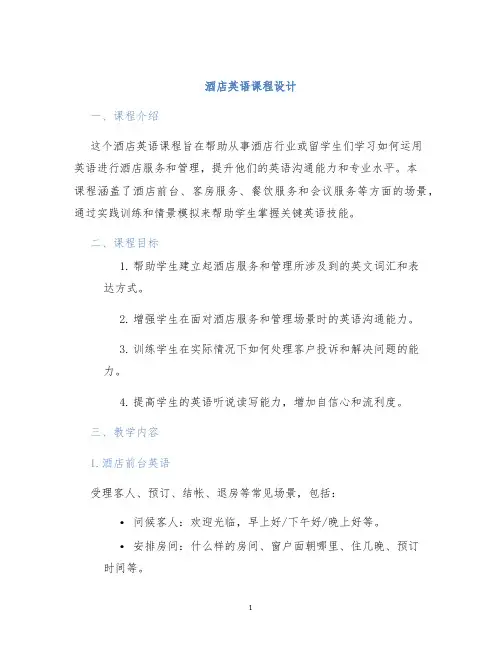
酒店英语课程设计一、课程介绍这个酒店英语课程旨在帮助从事酒店行业或留学生们学习如何运用英语进行酒店服务和管理,提升他们的英语沟通能力和专业水平。
本课程涵盖了酒店前台、客房服务、餐饮服务和会议服务等方面的场景,通过实践训练和情景模拟来帮助学生掌握关键英语技能。
二、课程目标1.帮助学生建立起酒店服务和管理所涉及到的英文词汇和表达方式。
2.增强学生在面对酒店服务和管理场景时的英语沟通能力。
3.训练学生在实际情况下如何处理客户投诉和解决问题的能力。
4.提高学生的英语听说读写能力,增加自信心和流利度。
三、教学内容1.酒店前台英语受理客人、预订、结帐、退房等常见场景,包括:•问候客人:欢迎光临,早上好/下午好/晚上好等。
•安排房间:什么样的房间、窗户面朝哪里、住几晚、预订时间等。
•支付方式:是否使用信用卡、是否需要收据等。
•解决客人问题:房间设施不良、网络连接问题等。
2.客房服务英语打扫房间、安排客人用品、解决客人问题等场景,包括:•打扫房间:更换床单、擦洗地面、整理房间等。
•客用品服务:毛巾、洗漱用品等。
•解决客人问题:替换故障产品、并清理问题区域等。
3.餐饮服务英语点菜、取餐、结账、服务等常见场景,包括:•介绍餐厅服务:餐厅位置、营业时间等。
•推荐菜品:什么菜品最受欢迎、特别之处等。
•点菜:用餐人数、所需菜品等。
•服务:过程、清理餐桌、是否需要继续为客人提供服务等。
4.会议服务英语会议接待、讲解、协调等场景,包括:•询问会议日程安排、嘉宾姓名等。
•为嘉宾提供咖啡、服務水等。
•帮助嘉宾注册会议等。
•确定会议结束时间,帮助收拾会场等。
四、教学方法1.情景模拟教学通过情景模拟,将学生置身于实际情境中,让他们用英语进行交流,提升他们在实际情况下的应变能力。
2.小组讨论安排学生分组进行酒店服务和管理情境的小组讨论,让他们学会听取别人的意见,讨论并解决问题。
3.个人演讲给每位学生指定特定的酒店服务情境,让他们进行个人英语口语演讲,提高他们的英语口语表达和自信心。
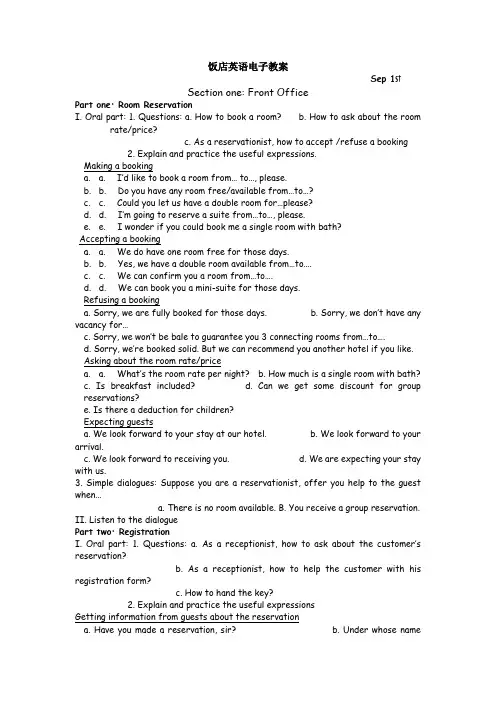
饭店英语电子教案Sep 1stSection one: Front OfficePart one: Room ReservationI. Oral part: 1. Questions: a. How to book a room? b. How to ask about the roomrate/price?c. As a reservationist, how to accept /refuse a booking2. Explain and practice the useful expressions.Making a bookinga. a.I’d like to book a room from… to…, please.b. b.Do you have any room free/available from…to…?c. c.Could you let us have a double room for…please?d. d.I’m going to reserve a suite from…to…, please.e. e.I wonder if you could book me a single room with bath?Accepting a bookinga. a.We do have one room free for those days.b. b.Yes, we have a double roo m available from…to….c. c.We can confirm you a room from…to….d. d.We can book you a mini-suite for those days.Refusing a bookinga. Sorry, we are fully booked for those days.b. Sorry, we don’t have any vacancy for…c. Sor ry, we won’t be bale to guarantee you 3 connecting rooms from…to….d. Sorry, we’re booked solid. But we can recommend you another hotel if you like. Asking about the room rate/pricea. a.What’s the room rate per night?b. How much is a single room w ith bath?c. Is breakfast included?d. Can we get some discount for group reservations?e. Is there a deduction for children?Expecting guestsa. We look forward to your stay at our hotel.b. We look forward to your arrival.c. We look forward to receiving you.d. We are expecting your stay with us.3. Simple dialogues: Suppose you are a reservationist, offer you help to the guest when…a. There is no room available. B. You receive a group reservation. II. Listen to the dialoguePart two: RegistrationI. Oral part: 1. Questions: a. As a receptionist, how to ask about the customer’s reservation?b. As a receptionist, how to help the customer with his registration form?c. How to hand the key?2. Explain and practice the useful expressionsGetting information from guests about the reservationa. Have you made a reservation, sir?b. Under whose namewas it made?c. How did you make the reservation, by telex or telephone?d. Did you reconfirm the booking?e. Sorry, there isn’t any room available, would you like us to try another hotel for you, sir?Helping guests with registration forma. Would you fill out this registration form, please? Here is a pen.b. May I have your signature, please?c. May I have your signature, please?d. Well, please write out your nationality/permanent home address/youroccupation/your next destination and passport number etc.Handing the key, etc.a. Here is your key card & key, sir.b. b.Please don’t forget to leave your key & key card at the reception when youcheck out, sir.3. Simple dialogue: A customer with a reservation comes and wants to checkin. ask her to fill out the registration form first and thenpresent her the room card and the key.Sep 8thPart three: Bell ServiceI. Oral part:1. Questions: a. Who is a bell boy?b. How to offer help to your customers as a bellboy?2. Explain and practice the useful expressionsOffering helpa. a.Welcome to our hotel. May I show you to your room?b. b.Let me help you with your luggage.c. c.May I help you with your suitcases, sir?d. d.Leave the luggage with me. I’ll get it up to your room.e. e.Don’t worry. We’ll send you a bellboy in a minute.f. f.Leave the letter with me, I’ll get them delivered.Special courtesy English for bellboya. After you, sir.b. Follow me, please.c. This way,please, sir.d. Please watch your steps, sir.e. Let me help you with your luggage, please.3. Simple dialogue: Play the part of a bellboy, help the guests when there is a fax forJimmy Brown in Room 304.4. Listen to the dialogues.Part four: At the cashier’sI. Oral part:1. Questions: a. What does a cashier do?b. b.How to help the guest change money and check out?2. Explain and practice the useful expressionsOn currency exchangeFor cashiera. a.How much would you like to change?b. b.The exchange rate is subject to alteration without notice.c. What denominations would you like?d. Traveller’s cheques are not valid until they are countersigned.For customersa. I want to change this bank note, please.b. I’d like to exchange some small notes.c. c.I’d like to cash this traveller’s cheque, please.d. d.Can I have my currency exchange receipt, please.On checking outFor cashierExplaining the billa. a.This figure here is for the phone calls you made from your room.b. b.This amount here is for the broken lamp and the soft drinks from themini-bar.c. c.Breakfast is included/excluded/extrad. Item 2 refers to theroom service.When there are miscalculations.a. a.Excuse me for a moment, I’ll check the details.b. b.I’m sorry, this is indeed a mistake. We’ll deduct this amount from your billright away.For customersa. a.I’m leaving this afternoon. Can I have my bill settled, please?b. b.Is this where I can pay my hotel bills?c. I’m checking out today. May I have my bill now?d. We’re leaving this afternoon. Would you get our bill ready for us? Room 404e. C ould you please explain this to me. I don’t think the figure should go that high.3. Simple dialogue: Mr. Thomson is checking out. As a cashier, please explainthe bill to him and ask him to show you his means ofidentifications and say good-bye to him.Sep 15thSection two: HousekeepingPart one: Chamber serviceI. Oral part:Explain and practice the useful expressions.Doing the rooma. a.When would you like me to do/make up your room?b. b.What time would it be convenient, sir?c. Would you like me to clean up /tidy up your room right now?Asking for permissiona. a.May I do the turn-down service for you now?b. b.We’d like to clean t he room. May we do it now?c. c.Would you like me to come back later?d. d.Would it be convenient if I returned at 9:45?Saying politely when disturbing the guesta. a.I’m sorry to disturb you.b. I hope I haven’t disturbed yo u.b. b.Sorry to have taken up your time.II. Listen to the dialogues.Part two: Laundry serviceI. Oral part: 1. Explain and practice the useful expressionsGiving information about laundrya. a.For laundry service, dial 6 and you will get housekeeping.b. b.The laundry forms and bags are in the top right handed drawer of thewriting table.c. c.The rate chart is contained in the stationery folder in your dresser’sdrawer, madam.Giving special requirements.a. a.I have some laundry to be done.b. I want to have a pantdry-cleaned.c. I’d like my sweater to be washed by hand in cold water.Telling about the extra chargea. a.We charge fifty extra for express.b. We deliver it within 4 hours at a50% extra charge.c. There is an extra charge of 50%for quick service.Comforting the guesta. a.Don’t worry. We have an express laundry service here.b. b.Don’t worry. We can arrange it for you.c. Don’t worry. Leave itto me.2. Simple dialogue:II. Listen to the dialogues.Se p 29thSection Three: Food and BeveragesPart one: Restaurant reservationsI. Oral part: 1. Explain and practice the useful expressionsAsking about the time of a reservationa. a.When would you like your table?b. b.When should we expect you?Refusing a reservationa. a.There aren’t any tables left for eight, but we can book one for you at nine.b. b.I’m terribly sorry. The restaurant is full.2. Role play: You want to reserve a table for three this evening at 6:00. II. Listen to the dialogues.Part two: Receiving the guestI. Oral part: 1. Explain and practice the useful expressionsAsking about a favorite tablea. a.Will this table be all right?b. b.Would you like to sit by the window?c. c.Would you prefer/rather sit near the window?d. d.Do you have a preferred table?2. Role play: You’ve got a reservation. The first table the waiter gives youis too near the door. You’d rather sit near the window.II. Listen to the dialogues.Part three: Taking ordersI. Oral part: 1. Explain and practice the useful expressionsRecommending dishesa. a.Why don’t you try…? It’s very good.b. b.I would suggest/recommend you have a taste of …c. c.Today, our specialty is …Asking about a dishWhat is … exactly?Asking for special instruction on fooda. a.How would you like your steak cooked?b. b.How do you like your steak done/prepared?2. Role play。
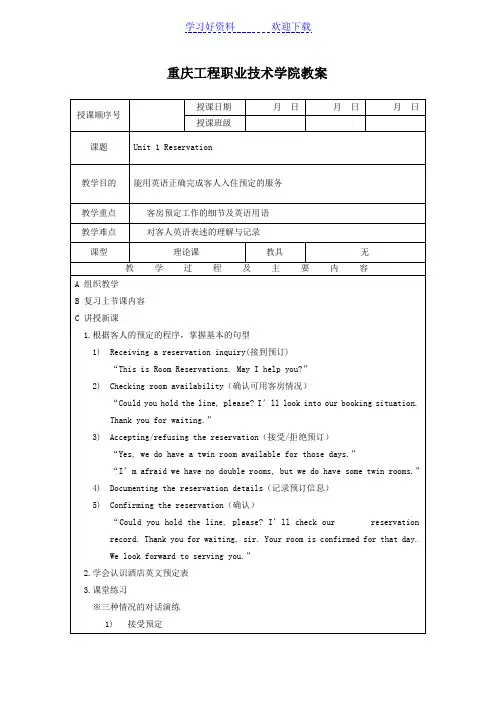
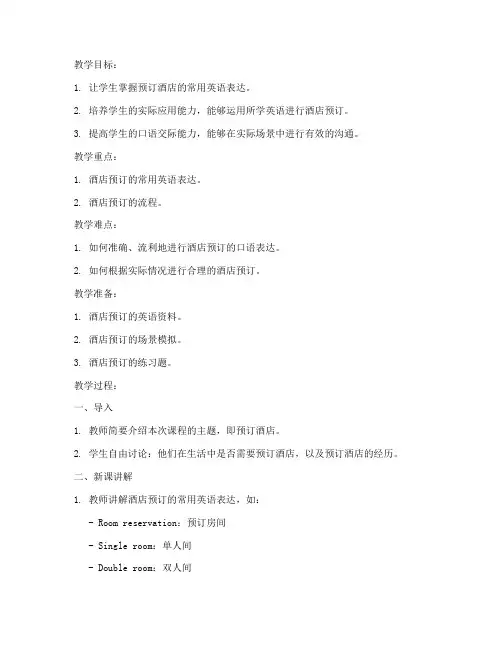
教学目标:1. 让学生掌握预订酒店的常用英语表达。
2. 培养学生的实际应用能力,能够运用所学英语进行酒店预订。
3. 提高学生的口语交际能力,能够在实际场景中进行有效的沟通。
教学重点:1. 酒店预订的常用英语表达。
2. 酒店预订的流程。
教学难点:1. 如何准确、流利地进行酒店预订的口语表达。
2. 如何根据实际情况进行合理的酒店预订。
教学准备:1. 酒店预订的英语资料。
2. 酒店预订的场景模拟。
3. 酒店预订的练习题。
教学过程:一、导入1. 教师简要介绍本次课程的主题,即预订酒店。
2. 学生自由讨论:他们在生活中是否需要预订酒店,以及预订酒店的经历。
二、新课讲解1. 教师讲解酒店预订的常用英语表达,如:- Room reservation:预订房间- Single room:单人间- Double room:双人间- Check-in:入住- Check-out:退房- Deposit:定金- Guarantee:担保- Cancellation fee:取消费用2. 教师展示酒店预订的流程,如:- 确定入住时间和退房时间- 选择房间类型- 提供个人信息- 支付定金或担保- 取消预订三、情景模拟1. 教师组织学生进行酒店预订的情景模拟,如:- 学生扮演客人,教师扮演酒店工作人员- 学生用英语进行酒店预订的口语表达2. 教师巡视指导,纠正学生的发音和语法错误。
四、练习巩固1. 教师布置练习题,让学生运用所学英语进行酒店预订的口语表达。
2. 学生独立完成练习题,教师巡视指导。
五、课堂小结1. 教师总结本次课程所学内容,强调酒店预订的常用英语表达和流程。
2. 学生分享学习心得,提出自己在学习过程中遇到的问题。
六、课后作业1. 学生回家后,用英语写一篇关于预订酒店的短文。
2. 学生将所学英语表达运用到实际生活中,尝试预订酒店。
教学评价:1. 学生在情景模拟中的口语表达能力。
2. 学生完成练习题的情况。
3. 学生课后作业的质量。
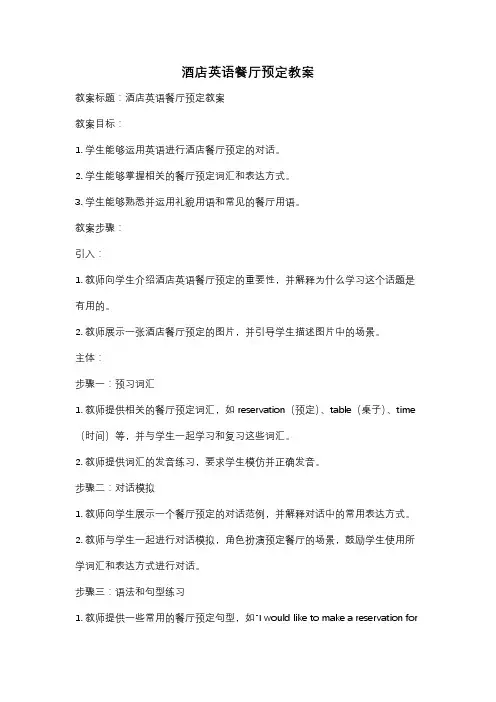
酒店英语餐厅预定教案教案标题:酒店英语餐厅预定教案教案目标:1. 学生能够运用英语进行酒店餐厅预定的对话。
2. 学生能够掌握相关的餐厅预定词汇和表达方式。
3. 学生能够熟悉并运用礼貌用语和常见的餐厅用语。
教案步骤:引入:1. 教师向学生介绍酒店英语餐厅预定的重要性,并解释为什么学习这个话题是有用的。
2. 教师展示一张酒店餐厅预定的图片,并引导学生描述图片中的场景。
主体:步骤一:预习词汇1. 教师提供相关的餐厅预定词汇,如reservation(预定)、table(桌子)、time (时间)等,并与学生一起学习和复习这些词汇。
2. 教师提供词汇的发音练习,要求学生模仿并正确发音。
步骤二:对话模拟1. 教师向学生展示一个餐厅预定的对话范例,并解释对话中的常用表达方式。
2. 教师与学生一起进行对话模拟,角色扮演预定餐厅的场景,鼓励学生使用所学词汇和表达方式进行对话。
步骤三:语法和句型练习1. 教师提供一些常用的餐厅预定句型,如"I would like to make a reservation for[number of people] at [time]"(我想预定[人数]人的座位,时间是[时间])等,并解释其用法。
2. 教师与学生一起进行句型练习,要求学生根据给定的情境进行合适的句子构造。
步骤四:角色扮演练习1. 教师将学生分成小组,每个小组扮演一个酒店工作人员和一个客人的角色。
2. 学生在小组内进行角色扮演练习,模拟真实的酒店餐厅预定对话,鼓励他们使用所学的词汇、表达方式和礼貌用语。
总结:1. 教师总结本节课的重点内容,并强调学生在日常生活中运用英语进行餐厅预定的重要性。
2. 教师鼓励学生在实际生活中尝试使用所学的英语表达方式,提高他们的口语能力。
扩展活动:1. 学生可以自行收集并分享不同国家或地区餐厅预定的文化差异。
2. 学生可以编写一篇关于酒店英语餐厅预定的对话剧本,并在班级内进行表演。

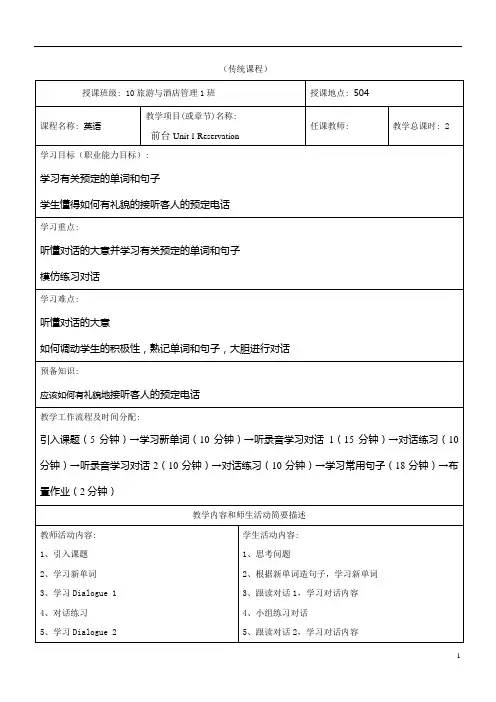
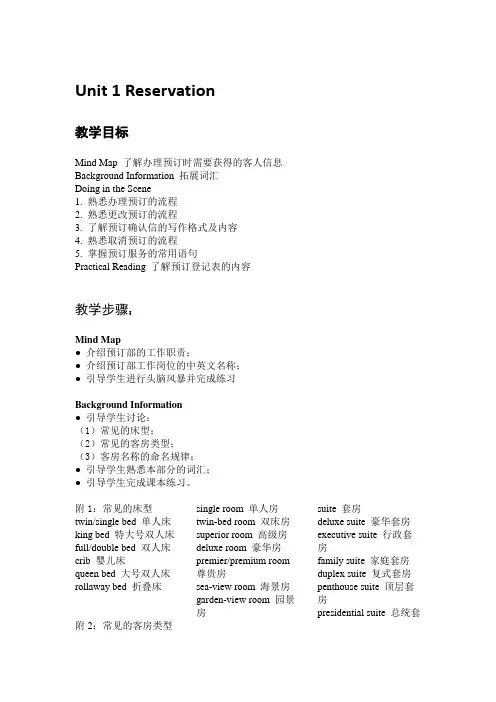
Unit 1 Reservation教学目标Mind Map 了解办理预订时需要获得的客人信息Background Information 拓展词汇Doing in the Scene1. 熟悉办理预订的流程2. 熟悉更改预订的流程3. 了解预订确认信的写作格式及内容4. 熟悉取消预订的流程5. 掌握预订服务的常用语句Practical Reading 了解预订登记表的内容教学步骤:Mind Map● 介绍预订部的工作职责;● 介绍预订部工作岗位的中英文名称;● 引导学生进行头脑风暴并完成练习Background Information● 引导学生讨论:(1)常见的床型;(2)常见的客房类型;(3)客房名称的命名规律;● 引导学生熟悉本部分的词汇;● 引导学生完成课本练习。
附1:常见的床型twin/single bed 单人床king bed 特大号双人床full/double bed 双人床crib 婴儿床queen bed 大号双人床rollaway bed 折叠床附2:常见的客房类型single room 单人房twin-bed room 双床房superior room 高级房deluxe room 豪华房premier/premium room尊贵房sea-view room 海景房garden-view room 园景房suite 套房deluxe suite 豪华套房executive suite 行政套房family suite 家庭套房duplex suite 复式套房penthouse suite 顶层套房presidential suite 总统套Doing in the Scene● 引导学生思考:(1)办理预订时如何询问客人的预订要求?(2)如何询问客人的联系信息?(3)完成预订前有哪些信息要与客人确认?● 引导学生思考预订服务的流程;● 引导学生听音频完成练习Scene 1 Making a reservationScene 2 Changing a reservationScene 3 Canceling a reservationPractical Reading● 介绍酒店预订登记表的基本内容;● 介绍预订部常见信函的写作格式及内容:(1)预订确认信;(2)修改预订确认信;(3)取消预订确认信;● 引导学生熟悉本部分的生词与词组;● 引导学生思考商务信函开头和结尾的常用语;● 引导学生完成练习Unit 2 Checking In and Out 教学目标Mind Map 了解前台接待员的工作职责Background Information 拓展词汇Doing in the Scene1. 熟悉办理入住登记的流程2. 了解前台增销的艺术3. 熟悉延宿与换房的流程4. 熟悉结账退房的流程5. 掌握前台接待服务的常用语句Practical Reading 了解酒店账单的内容教学步骤:Mind Map● 介绍前台接待员的工作职责;● 介绍前台工作岗位的中英文名称;● 引导学生进行头脑风暴并完成练习。
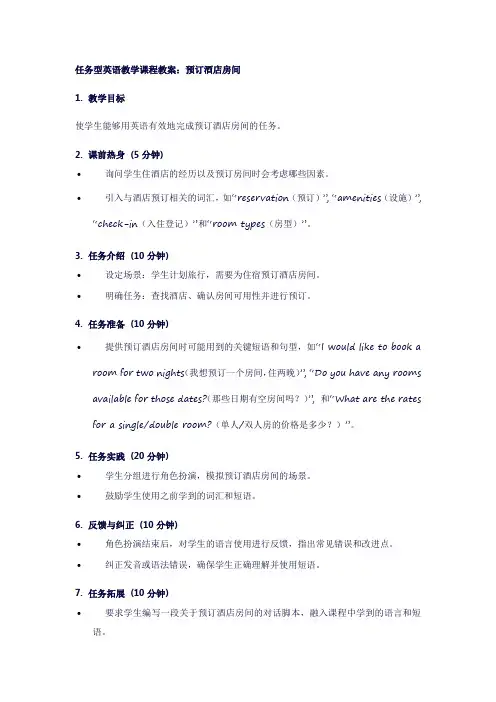
任务型英语教学课程教案:预订酒店房间1. 教学目标使学生能够用英语有效地完成预订酒店房间的任务。
2. 课前热身(5分钟)•询问学生住酒店的经历以及预订房间时会考虑哪些因素。
•引入与酒店预订相关的词汇,如“reservation(预订)”, “amenities(设施)”, “check-in(入住登记)”和“room types(房型)”。
3. 任务介绍(10分钟)•设定场景:学生计划旅行,需要为住宿预订酒店房间。
•明确任务:查找酒店、确认房间可用性并进行预订。
4. 任务准备(10分钟)•提供预订酒店房间时可能用到的关键短语和句型,如“I would like to book a room for two nights(我想预订一个房间,住两晚)”, “Do you have any rooms available for those dates?(那些日期有空房间吗?)”, 和“What are the rates for a single/double room?(单人/双人房的价格是多少?)”。
5. 任务实践(20分钟)•学生分组进行角色扮演,模拟预订酒店房间的场景。
•鼓励学生使用之前学到的词汇和短语。
6. 反馈与纠正(10分钟)•角色扮演结束后,对学生的语言使用进行反馈,指出常见错误和改进点。
•纠正发音或语法错误,确保学生正确理解并使用短语。
7. 任务拓展(10分钟)•要求学生编写一段关于预订酒店房间的对话脚本,融入课程中学到的语言和短语。
•鼓励学生发挥创意,考虑不同场景,如询问酒店设施或协商房价。
8. 课程总结(5分钟)•总结本课要点,复习与预订酒店房间相关的词汇和短语。
•鼓励学生课后实践,尝试在线或电话预订酒店房间,以巩固所学。
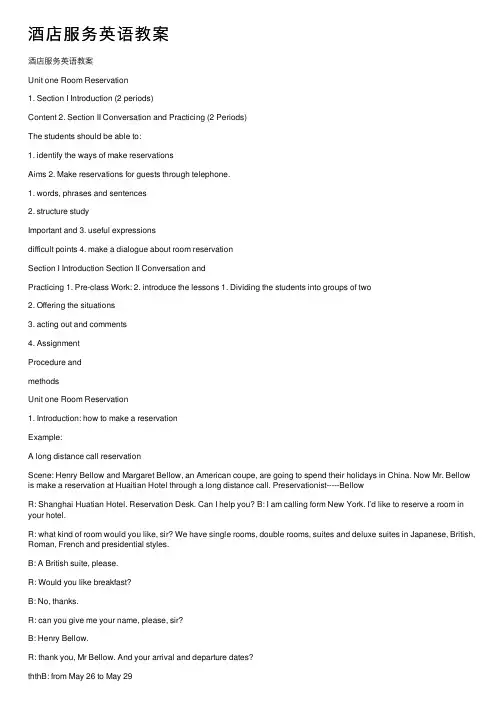
酒店服务英语教案酒店服务英语教案Unit one Room Reservation1. Section I Introduction (2 periods)Content 2. Section II Conversation and Practicing (2 Periods)The students should be able to:1. identify the ways of make reservationsAims 2. Make reservations for guests through telephone.1. words, phrases and sentences2. structure studyImportant and 3. useful expressionsdifficult points 4. make a dialogue about room reservationSection I Introduction Section II Conversation andPracticing 1. Pre-class Work: 2. introduce the lessons 1. Dividing the students into groups of two2. Offering the situations3. acting out and comments4. AssignmentProcedure andmethodsUnit one Room Reservation1. Introduction: how to make a reservationExample:A long distance call reservationScene: Henry Bellow and Margaret Bellow, an American coupe, are going to spend their holidays in China. Now Mr. Bellow is make a reservation at Huaitian Hotel through a long distance call. Preservationist-----BellowR: Shanghai Huatian Hotel. Reservation Desk. Can I help you? B: I am calling form New York. I’d like to reserve a room in your hotel.R: what kind of room would you like, sir? We have single rooms, double rooms, suites and deluxe suites in Japanese, British, Roman, French and presidential styles.B: A British suite, please.R: Would you like breakfast?B: No, thanks.R: can you give me your name, please, sir?B: Henry Bellow.R: thank you, Mr Bellow. And your arrival and departure dates?ththB: from May 26 to May 29thR: very well, Mr. Bellow. A British suite without breakfast from May 26thto May 29. Am I correct, Mr Bellow? B: yes, thank you. One more thing, could you tell me how to guaranteemy reservation?R: I’ll just need your credit card number , and I’ll take ca re of the rest. B: card. No. 1724,4018,2273,1868. R: thank you, Mr Bellow. You’ll be expected to be here then.B: That’s fine. Thank you, madam. Good-bye. R: Good Bye.2. Function studyConnecting telephone calls.1) 招呼语:Good morning. This is Huatian Hotel.Room number, please.2) 请对⽅等候Just a minute, please. I’ll put it through to …Hold the line please. I’ll connect you to …3) 听不清I’m sorry, I can’t hear you, and could you speak a bit louder?Could you repeat that, please?4) 占线I’m sorry. The extension is busy right now; will you try the call later?5) 受话者不在Sorry, Mr. Bellow is not in right now. Would you call back?6) 打错了I’m afraid you’ve got the wrong number.3. 情景剧表演,role- play,Situation:Client: your name is Bill Brown. You’d like to book a single room ndrdwith shower for October 2 and 3.Hotel employee: You answer the phone and accept the booking. Make a dialog according to this situation.4. Useful expressions:1) Find out what the client wants:-what kind of room would you like to have?-do you prefer bath of shower?-would you like breakfast?-how long do you plan to stay?-could you let me know how long you will be staying?2) Accepting a booking:-I can book you a room for the first and the second.-we can confirm a room for May 30.-it’s fine for Monday night.3) Refusing a booking:-unfortunately, we’re fully booked for single rooms. But I canbook you b double.-If there isn’t any room, we can put you on a waiting list or we canfind you a room in another hotel.-sorry, we won’t be able to guarantee you a room for the first of May.4) Finding out who the client is:-Can you give me your name, please?-May I know your name?-can you give me your address, please?-what is your address, please?Unit Two At the Reception Desk1. Section I Introduction (2 periods)Content 2. Section II Conversation and Practicing (2 Periods)The students should be able to:1. register for the guestsAims 2. receive the walk-in guest1. words, phrases and sentences2. structure studyImportant and 3. useful expressionsdifficult points 4. make a dialogue about the registrationSection I Introduction Section II Conversation andPracticing 1. Pre-class Work: 2. introduce the lessons 1. Dividing the students into groups of two 3. give the example 2. Offering the situations3. acting out and comments4. AssignmentProcedure andmethodsUnit Two At the Reception Desk1. Introduction: how to register the guestExample:The registrationScene: A car pulls up in front of Huatian Hotel and a doorman goes forward to meet the guests opening the door of the car for them. Dm: Good evening, sir and madam. Welcome to our hotel.Mr Bellow (B): Thanks. Good evening.Dm: I’m the bellman, Mr Bellow. So you have got alto gether four pieces of baggageB: Yes.Dm: The Reception Desk is straight ahead. After you, please. Receptionist (R): Good evening. What can I do for you, sir? B: I reserved a British suite three weeks ago. I’m Henry Bellow.R: Just a moment, please, Mr Bellow. I’ll check the arrival list. , Could I see your passports, please?Thank you sir. And would you mind filling in the registration form? B: I will take care of it.Here you are, is it all right?R: yes, thanks. How are you going to pay, in cash or by credit card? B: could I pay with traveler’s checks?R: certainly. Here’s the key to Room 908 and your room cards. Pleasekeep them.And the bellman will show you up. Have a nice evening, sir. And enjoy your stay.B: thank you.2. Function studyGreetings and Getting Acquainted , 初次见⾯。
酒店英语视听说unit2BookingRooms教案(共5篇)第一篇:酒店英语视听说 unit 2 Booking Rooms教案酒店英语视听说 unit 2 Booking Rooms教案Teaching Objectives 教学目标:语言知识:学会与Booking rooms 相关的词汇和句子表达语言技能:1.Improve the students’ ability in listening and speaking,通过Predicting 和watching and listening for understanding 等技能的训练,提高学生获取相关信息的能力2.Learn and master some words and expressions of booking rooms.Important Points 重点:1.Learn some words about booking rooms.2.Expressions of booking rooms, for example: Would you like a single room or double room? Difficult Points 难点: Expressions of booking rooms Teaching Methods 教学方法:1.Show them some pictures about food and ask questions to attract students’attention2.watching-Listening-and-answering activity to improve the students’ listening ability3.Pair work or individual work to make as many students as possible work in class.Teaching Procedures 教学过程:StepⅠ Greetings and Warming up 1:相互问候后,T 引出今天学习内容2:提问学生关于出外旅行,预订房间一般需要什么信息:日期,住几晚,需要什么类型的房间,进入PPT 图片(见PPT): Look and match: Showerdouble roomdouble bedpassport 3: fill in the blanks with suitable words: 详见课本和PPT StepⅡ Preparation before watching and listening the Video1 1: Learning new words reception n.接待 reserve v.预订 double adj.双的 single adj.单个的confirm v.确认 date n.日期look forward to 期望from...to...从……到……2: Some useful skills for watching and listening: Watching and listening for general meanings □Do not try to understand everything!□Watch and Listen for the main words.□Watch and Listen to what is important.e.g.WHO(name)WHERE(place)WHEN(time)Step Ⅲ: Watching and listening Video 1 1: watch the video, Decide true(T)or false(F)详见课本,PPT 2:Watch the video again and then fill in the Clerk’s words.详见课本,PPT 3: Role-play the dialogue with partners 4: Pair work:Discuss what to say to the guest in the following situations and then write out the correct expressions 1.When the guest wants to reserve a room…2.When the guest wants to book a single room for July14th…Step Ⅳ Summary : ngu age tipsImportant sentence to the expression of booking rooms ⌝May I help you? ⌝ Would you like a single room or double room? ⌝ For which date/day, please? ⌝ May I have your name, please?2Some important things for booking issues: name of the guestAddress of the guestWhat kind of room he/she wants to book What time he/she will come and leave How long he/she will stayStepⅤhomework第二篇:英语视听说(本站推荐)1,Mention at least three reasons people get angry.What can we do to control our anger?People tend to get angry when treated unfairly.Specifically, we may fly into a rage when we realize we were betrayed by a close friend or tricked by a clerk into buying something unnecessary at a high price.When people treat us with contempt, or deliberately ignore us, we may get annoyed.Also, the sight of injustice often fills us with indignation.For instance, when we see a child being bullied by a group of hoodlums, it makes our blood boil.To overcome our anger, we have two options: to fight or to run.In the case of a small offense, it's better to walk away and calm down.It is not necessary to explode at a slight provocation.However, when confronted with a gross injustice or a serious crime, we need to stand up for ourselves and speak our mind.After venting our anger, we may feel better.If we keep negative feelings to ourselves, we will probably feel miserable for a long time and regret not taking action.2,Why do people get depressed? Is there any connection between depression and bad luck? Can depression be overcome?People feel blue for a variety of reasons.They feel depressed after failing an exam or losing a job.They feel grief when someone dear to them, for example a close family member, passes away.Suffering from a serious disease with little hope of a complete recovery, one may feel dejected.There seems to be a relationship between depression and bad luck.If your spirits are down and you show it, people might refrain from talking to you.Many good opportunities may slip away as a result.And you might be left wondering why your luck doesn't change.To cheer yourself up, you can study or work.Your mood might improve if you keep yourself busy and try to achieve goals.And if stayingbusy doesn't help, you can just wait for the sadness to go away.It is said that time heals all wounds.Finally, you might find solace in realizing.Your situation is not the worst.You can also choose to look at the bright side of things because every cloud has a silver lining.3,What makes you happy? Are you happy when others are happy?The greatest pleasures seem to come from hard-won achievements.For example, if after a lot of hard work, you passed an important examination, finished a big project, or got a promotion, you would feel incredibly happy, right? Human happiness is not limited to one's good fortune or success.If you help someone in need, you'll probably feel wonderful.This accounts for the success of Project Hope, through which people volunteer time and donate money to help people in need.4,Is there a relationship between reason and emotion? Which plays a bigger role in our lives?Both reason and emotion are important in our lives.Although they are obviously different from each other, they complement each other just the same.Think about it, it is difficult to isolate reason from emotion and vice versa.When one is arguing, one is combining logic with feelings.When a speaker is advocating a principle, the feeling he puts into his voice reinforces his argument.When scientists conduct researches, they may choose an area that is interesting to them.Darwin studied science because he had been fascinated by plants and animals since his childhood.However, in some areas either reason or emotion may play a bigger role.Science students may need more logic than emotion to conduct experiments, while art students tend to rely more on their emotion for creativity.Within a family, people usually cherish the emotional ties between familymembers.Emotion could be moreimportant than reason when falling in love or trusting a member of one's family, whereas reason plays an important role when deciding how to educate a child.T ogether or separate, reason and emotion play critically important roles in our lives.What do you think? Or feel? 1,In what ways can people improve their appearance?Some people just want to improve their looks in small ways.They may go on a diet to maintain a good figure, use makeup to improve their appearance, put a facial mask or a skin soother on their faces during the night, have their teeth straightened, or have their nails polished.Some others have a face-lift to change their nose or chin, make their single-fold eyelids double folded, and have their skin tightened to smooth out wrinkles and crow's feet.Some even inject botox(肉毒素)to remove wrinkles.More drastically, some people may have liposuction to remove fat.2,Why do some people want to improve their appearance?A love of beauty is part of human nature.People like to see beautiful scenery, flowers, and animals.It is not strange that they also want to look at good-looking humans and improve the way they look themselves.With improved features, one may find a better job, attract a more desirable spouse, and gain faster promotion.Some occupations attach great importance to appearance.Most actors, anchorpersons, and fashion models can be recognized by their looks.It is sometimes argued that by looking good, one tends to feel self-confident.With confidence, success is more likely to follow in any undertaking.3,What disadvantages are there in plastic surgery?We should not attempt to change our physical appearanceby cosmetic means.Such changes may bring unexpected disasters in the future.Some beautifying methods, if not properly applied, have dangerous side effects.People who receive botox injections to remove wrinkles may eventually ruin their skin.Some surgical operations that are intended to make single-fold eyelids double fold actually make them multi-folded--not what the patient had in mind.4,How can one strike a balance between buying clothes on a budget and yet having fashionable clothes to wear?People who don't have much money can also make themselves look fashionable.There are many ways to buy fashionable clothes without spending much money.For example, people can buy clothes that are on sale or sold in discount stores.It's smart to buy winter clothes at the end of the winter.Clothes are cheaper at the end of a season and can be stored until the next season.Some people are good tailors, and they can alter their clothes to make them fashionable.They may even create original styles.1,Describe some superstitions in English-speaking countries.English-speaking nations have a number of superstitions.For example, many people believe 13 to be an unlucky number, and do not want to live on the 13th floor or in Room 13.They say “knock on wood” or “touch wood” to avoid bad luck.To wish somebody good luck, they may say “I'll cross my fingers for you.” Superstitious people avoid walking under a ladder or opening an umbrella in doors.When they see a black cat run across their path, they think it's a bad omen.Some people may hang a horseshoe over their door to ward off bad luck.If they happen to drop a mirror, they worry that they will have seven years' bad luck.To ensure good luck, they may carry a charm of some kind, such as a lucky rabbit's foot!2,What is the relationship between one's attitude to life and one's fate? Does the former determine the latter or is it the other way round?Since the world is complex and mysterious, it is not easy to arrive at a definite conclusion.Some scholars, including a British psychologist, suggest that there exists a correlation between one's attitude to life and one's fate.But more research is needed before we can be sure of such a correlation.Moreover, the cause-and-effect relationship has not been clearly identified, and we are uncertain which causes which.In real life we can find counter examples: Some optimistic people are not very lucky, while some pessimistic people are quite lucky.Perhaps we should try to find out which case is more frequent: optimistic people with good luck or optimistic people with bad luck.Judging from my personal observations, the former is more common.I can even supply the reason: Optimistic people have more self-confidence, which facilitates their success in life.A survey involving many people is required to discover what most people think about this issue.3.Do you believe there are extraterrestrial beings in outer space?It is difficult to come to a definite conclusion on this issue.On the one hand, many people claim to have seen a UFO, and some even assert that they were abducted by aliens in their spaceships.Theoretically, it is difficult to prove that in the vast universe people on Earth are of the most advanced civilization and have the most advanced technology.If we cannot see ETs, it may be because they are far more advanced than we are.Similarly, if primitive people cannot detect radio waves, it does not mean more advanced civilizations do not exist.On the other hand, human beings have not collected solid evidence to prove theexistence of ETs.Although some people claim to have witnessed a UFO, it could be a visual mistake.A mirage is a case in point.When somebody claims to have seen a ghost, do you believe it? In my opinion, while mankind should continue to explore mysteries in the universe, they had better direct most of their time and energy toward pursuits that are more relevant to their present lives.4,Do you think success is due more to luck and opportunity or to diligence and perseverance? Why?Sometimes a lucky person achieves great success without making the corresponding efforts, while a person who has worked diligently on and on fails to accomplish anything.But on the whole, I am inclined to believe that success is more closely related to diligence than to luck.It is true that in gambling, card-playing and some other games, luck plays a large role.But in most fields of endeavor, one has to study and work hard before one has a chance of success.For example, all scientists, engineers, teachers, musicians and athletes must receive years of rigorous training before they can do their work properly and stand out from the rest.Without hard work, they have almost no hope of success at all.After all, opportunity favors those who are well prepared.1,Name at least ten recreational activities, including those requiring a lot of physical exertion and those that are more relaxing.ome forms of recreation require a high level of physical activity.Here are some examples: football, basketball, badminton, tennis, and table tennis.Some people like climbing mountains, going bodysurfing, or going rafting.After those strenuous outings, they feel mentally relaxed.On the other hand, some people prefer more sedentary(久坐的)activities.Instead of playing a ball game, they watch it.They go to a cinema, a theater, an opera house or a concert hall, or they simply sit at home watchingTV.Some play various kinds of games on the computer, and others play chess or cards.Even when they want to stay outdoors, they may choose peaceful pastimes like fishing.2,What do you think about the computer and the Internet as sources of entertainment?With the advent of the computer and the Internet, we can play all kinds of games in the virtual world;we can play chess and cards with people we have never met, even a chess master.We can travel to all parts of the world on the Net.We can send and receive e-mails, and chat with people online.Moreover, we can make use of the Net as a way of learning.But we should be careful not to get too much of a good thing.If we sit in front of a computer all day long, there will be many negative effects.Our eyes may get damaged.Long exposure to radiation from the computer may cause disease.Too much sedentary work is bad for our health.We may become physically weak and develop a weight problem.Worse still, if we get addicted to the computer, we may neglect human relationships and communication between one another.In the end we would rather talk to a computer than to a human.3,Would you like to go on a tour during the vacation?If I have enough money, I'd like to visit a distant place during my vacation.After a term of hard work, I think I deserve a trip for relaxation.From the trip, I could gain useful geographical and historical knowledge about the place--knowledge different from what we acquire from books.Furthermore, I would be refreshed from traveling, and then I could work more energetically in the next term.However, if I do not have enough money to travel, I can relax myself in many other ways.I can go to parks, or enjoy local scenic and historical sites.What's more, on the Internet I can visitremote places of the world.I can play computer games to kill time.Perhaps I will also do a lot of reading.If I arm myself with abundant knowledge, I may find a good job, which will offer me opportunities for traveling both at home and abroad 4,Stores are closed in the evenings and on Saturdays and Sundays in many Western countries, while they are normally open in China.Which system do you prefer? Why?In my opinion, each system has its advantages and disadvantages.The weekend is meant for people to have a rest, and the employees at stores, post offices, government departments, schools and so on all deserve a rest.The two-day weekend was won after centuries of demands for workers' rights.If one store breaks the rules and stays open on the weekend, it will do unusually good business, but this is unfair competition.If people can enjoy proper rest over the weekends, they can work more vigorously during the weekdays.However, if all stores are closed, this can be inconvenient for many people, especially those in double-income households.If a small proportion of the population, that is those in the service industry, work on weekends, most people will enjoy their weekends even more.On the whole, I am in favor of the current Chinese system 1,What are the essential differences between the concepts of individualism and collectivism? Search the Internet for information.Individualism asserts the primary importance of the individual and holds that anindividual's interests should be placed above the group's.Individuals are being given opportunities and freedom to develop character, interests, abilities, careers, etc.within the context of individualism.In addition, the collective culture respects and even values the initiatives of each reason.On theother hand, collectivism emphasizes the interests of the group over those of the individual.It is believed that if the group prospers, all its members prosper.If an individual works for the benefit of the group, he or she will benefit as well.Sometimes collectivism requires individuals to sacrifice their short-term interests to the group's long-term goals.Perhaps we should strike a balance between promoting team spirit and bringing individual initiative into play.2,Should we follow the ethics of hard work or introduce fun into our work?In my opinion, we can introduce fun into our work, but an industrious spirit is a more valuable element.It's true that people like to have fun, and that if learning involves fun, people tend to learn faster.Without fun, learning can be slow or even painful.This is illustrated by the popular saying, “All work and no play makes Jack a dull boy.” However, since many people do not study or work hard, I think it is necessary to stress diligence at the present stage in the nation's development.T o attain advanced levels, we have to make greater efforts.If we all work hard, our offspring will be able to have more fun.Although fun plays a role in work and study, most human achievements are gained mainly through hard work.Most successful people have worked diligently to achieve success.After all, “no pain, no gain.”3,Should different cultures integrate or keep their own characteristics?A well-integrated nation is more capable of maintaining unity and stability.People in some countries dislike foreigners or ethnic minorities to behave differently from the norm.They prefer foreigners to assimilate into their culture.The saying, “When in Rome, do as the Romans do,” illustrates this point.The trend toward globalization promotes international exchanges andintegration of different cultures.On the other hand, diversified cultures make our world more interesting and colorful.If all nations integrated into one, the world would be monotonous.Therefore, all ethnic groups should be allowed to keep their unique customs.The Chinese government has adopted favorable policies to allow the ethnic minorities to keep their traditions.All nations should be treated rge nations should not pose their cultures on small nations.The world is composed of different countries and cultures.To achieve better development and cooperation, perhaps we should advocate multiculturalism while encouraging free exchanges between cultures.4,Should we be punctual for class, work or appointments? Why? What can you do to ensure punctuality?In the past, Chinese did not attach much importance to punctuality.In an agricultural country punctuality was not very important.But nowadays, owing to the quickened pace of life and the influence of Western concepts of time, the Chinese seem to be paying more attention to punctuality.If somebody is twenty minutes late for an appointment, you may be annoyed because it is a waste of your time.To avoid being late, we should make adequate preparations.In case an emergency prevents us from arriving at the destination on time, we can call ahead to inform the person concerned of the delay.But for entertainment activities like a party, we may be a bit late, for that causes no inconvenience to others.第三篇:英语视听说试题话题:1、on low-carbon lifestyle2、on water shortage3、government officials' shocking words4、a letter of thanks on fathers' day5、on-line shopping要求:口述1.5-2min流利性 20%发音30%语法50%第四篇:七年级英语视听说七年级英语视听说科目名称:七年级英语视听说教师及简介:吴丽红,七年级英语老师科目目标:知识与技能:通过英语动画片的观看学习,能从动漫中获取主要信息和观点,能根据视听目的确定不同的视听策略,并形成对事物表自己观点的能力,为终身学习奠定基础。
英语预订酒店教案教案标题:英语预订酒店教案教案目标:1. 学生能够使用英语准确地预订酒店并处理相关问题。
2. 学生能够理解和运用与酒店预订相关的常用英语词汇和表达。
3. 学生能够通过角色扮演和实际练习提高口语表达能力。
教学重点:1. 酒店预订的基本流程和相关词汇。
2. 学生能够运用所学知识进行实际对话和问题解决。
3. 学生能够通过角色扮演和实际练习提高口语表达能力。
教学难点:1. 学生能够灵活运用所学知识进行对话和问题解决。
2. 学生能够理解并运用一些常见的酒店预订问题的解决方法。
教学准备:1. PowerPoint幻灯片或白板和标记工具。
2. 酒店预订相关的图片、广告或海报。
3. 角色扮演的卡片或名牌。
4. 学生练习对话的材料。
教学过程:Step 1: 引入1. 利用幻灯片或图片展示一些酒店的照片和广告,引起学生对酒店预订的兴趣。
2. 通过提问学生对酒店的预订体验和问题,激发学生的思考和讨论。
Step 2: 词汇和表达1. 教授一些与酒店预订相关的常用词汇和表达,如"reservation"(预订)、"check-in"(办理入住手续)、"check-out"(办理退房手续)、"room service"(客房服务)等。
并通过例句和实际对话演示其用法。
2. 学生跟读和模仿这些词汇和表达,并进行相关练习。
Step 3: 酒店预订对话示范1. 通过幻灯片或白板展示一段酒店预订对话的示范,包括客户询问房间类型、价格、入住和退房时间等信息,以及酒店工作人员的回答和建议。
2. 解释并讲解对话中的关键词汇和表达。
3. 学生跟读对话,并进行角色扮演练习。
Step 4: 学生实践1. 将学生分成小组,每个小组有两名学生扮演客户和酒店工作人员。
2. 给每组分发一份酒店预订对话的练习材料,让学生进行角色扮演练习。
3. 监督和指导学生的对话,提供必要的帮助和反馈。